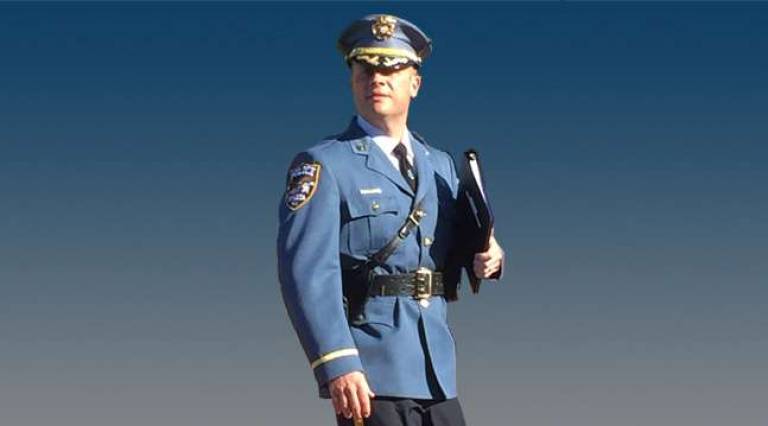Sparta's new police chief sets his course


By Joseph Picard
Sparta — “The police are the public and the public are the police.”
That idea, articulated close to 200 years ago and attributed to Sir Robert Peel, who founded the London Metropolitan Police Department in 1822, is still fresh and full of meaning. Neil Spidaletto, Sparta’s new police chief, quotes it readily, and knows the line that follows.
“The police being only members of the public who are to give full-time attention to duties which are incumbent on every citizen in the interests of community welfare and existence.”
“What those lines and the rest of Peel’s nine principles of policing mean is usually expressed nowadays in a simplified form,” Spidaletto said in a recent interview with the Sparta Independent. “The role of law enforcement is to protect and serve. To protect and serve the public, whom we are a part of.”
Born in Jersey City, the 44-year-old Spidaletto has lived nearly his whole life in Sparta and has always been close to both the police and the public. His father, Joseph Spidaletto, was a Jersey City fireman who became a Sparta policeman in 1978 and rose through the ranks to lieutenant before retiring 25 years ago. Since being sworn in on June 2 to replace former Chief Ernie Reigstad, the younger Spidaletto has occasionally poked fun at his proud father, pointing out that “I can now say to him that I officially outrank him.”
Spidaletto graduated Sparta High School in 1991 and Villanova University in 1995. He joined the Sparta police force as a patrolman that same year. In 1999 he made detective; in 2003, sergeant; and was promoted to lieutenant in 2013. While on the force, he earned a masters in public administration from Seton Hall University and graduated the FBI’s national academy.
“To say he is qualified for this job is an understatement,” Sparta Deputy Mayor Josh Hertzberg said the day of Spidaletto’s swearing in. “He has a steady moral compass and natural leadership skills.”
Having been high in the chain of command for several years, and most recently serving as acting chief after Reigstad’s retirement in March, Spidaletto comes to the job with eyes wide open.
“Law enforcement has definitely changed since I started,” he said. “It’s become more complex and more demanding. Constantly there are new laws and new guidelines, coming from the state Attorney General and the county prosecutor. It’s a challenge to keep our officers updated.”
And he knows that he doesn’t have enough officers. Sparta, a township of roughly 20,000, has 28 sworn officers. Spidaletto explained that, before the Great Recession, the municipality employed 41 officers.
“The reasons for the reduction were economic,” he said. “I don’t believe we can get back right away to that figure of 41, but we are looking to increase the force up to 34 officers.”
He said plans are already in the works to add officers and that he has the support of Sparta’s municipal government.
Spidaletto addressed some of the major challenges law enforcement faces not only in Sparta, but throughout the state and the nation.
“I was lucky to experience the FBI program,” he said. “It opened my eyes to what’s going on in the world.”
Two separate and devastating terrorist events occurred in 2015, when Spidaletto was training at the FBI academy – the Paris attacks of November 13 and the San Bernardino, California attack of December 2.
In Paris, groups of ISIS-connected terrorists, with bombs and automatic weapons, targeted a stadium, several cafes and a concert hall, killing 130 people (not counting 7 terrorists) and injuring hundreds more. In San Bernardino, domestic terrorists, an ISIS-inspired husband and wife, killed 14 people and wounded 22 at a Christmas party.
“You never know when an incident like that can happen,” Spidaletto said.
The fact that Sparta is an upscale, peaceful community where people might suppose that “an incident like that” would never happen, should not deter law enforcement from being prepared, the chief said.
With three high schools, numerous grammar schools and daycare centers, and everyone used to the free movement of an egalitarian society, idyllic Sparta nonetheless presents “the potential for a vicious incident,” Spidaletto said.
With that in mind, local law enforcement trains for worst-case scenarios. Sparta police train in coordination with other Sussex County police departments and the New Jersey State Police, to ensure that all the officers are on the same page regarding what to do if the unthinkable happens.
“It’s all in the training,” Spidaletto said. “We train together with other departments and we meet constantly with Homeland Security and State Police, going over how to do lock-downs, how to react in hostage situations, or when there’s an active shooter.”
He added that federal law enforcement agencies, like the FBI and the DEA, are more understanding and supportive of local policing efforts in the post-9/11 world.
One thing that hasn’t changed for police in the modern era, Spidaletto pointed out, is the responsibility of an officer when there is an active shooter.
“Every officer, myself included, whether alone or with others, has the responsibility to stop the shooter as quickly as possible,” he said.
Another huge and more immediate modern-day challenge for law enforcement, and society as a whole, is the opioid epidemic ravaging a large part of the population. Spidaletto holds out hope that the changed approach of law enforcement to the afflicted will eventually yield positive results.
“The approach has gone from punitive to trying to get people help,” he said. “We have to make a distinction between bad people and those who are hurting themselves.”
Spidaletto pointed to the C.L.E.A.R. program, a multi-stakeholder effort spearheaded in the county by Newton Police Chief Michael Richards, as an example of the more compassionate approach to those with addictions.
“People who commit crimes must of course be held responsible, but such programs encourage addicts to turn in their drugs and seek help,” he said.
The Sparta police department has taken numerous measures to bring the police and the public closer together in maintaining a just and vigilant society. One is the Citizens Emergency Response program.
“We now have 50 residents who are trained and who we can call upon to assist us in emergencies, whether natural or man-made,” he said.
The police also make use of modern technology, platforms like Facebook and Youtuibe, and programs like Community Matters, Coffee with a Cop and Hidden in Plain Sight to build, maintain and strengthen the bonds between the police and the public.
Spidaletto is optimistic and committed to his work. He is also committed to his family.
“I have a lovely wife of 16 years, Lisa, and a beautiful seven-year-old daughter Peighton,” he said. “I know I will carry out my duties and responsibilities. But I will also be sure to reserve time for my daughter. There are things I don’t want to miss out on with her.”
That was something that Robert Peel recognized: Police officers, even chiefs, are also people.